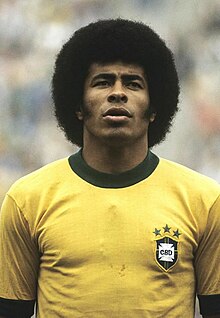 Jairzinho with Brazil in 1974 | |||||||||||||||||||||||
| Personal information | |||||||||||||||||||||||
|---|---|---|---|---|---|---|---|---|---|---|---|---|---|---|---|---|---|---|---|---|---|---|---|
| Full name | Jair Ventura Filho | ||||||||||||||||||||||
| Date of birth | 25 December 1944 | ||||||||||||||||||||||
| Place of birth | Rio de Janeiro, Brazil | ||||||||||||||||||||||
| Height | 1.73 m (5 ft 8 in) | ||||||||||||||||||||||
| Position(s) | Winger, striker | ||||||||||||||||||||||
| Youth career | |||||||||||||||||||||||
| 1958–1960 | Botafogo | ||||||||||||||||||||||
| Senior career* | |||||||||||||||||||||||
| Years | Team | Apps | (Gls) | ||||||||||||||||||||
| 1960–1974 | Botafogo | 416 | (186) | ||||||||||||||||||||
| 1974–1975 | Marseille | 18 | (9) | ||||||||||||||||||||
| 1975 | Kaizer Chiefs | 3 | (7) | ||||||||||||||||||||
| 1976 | Cruzeiro | 24 | (9) | ||||||||||||||||||||
| 1977 | Portuguesa (VEN) | 24 | (22) | ||||||||||||||||||||
| 1978 | Noroeste | 10 | (4) | ||||||||||||||||||||
| 1979 | Fast Clube | 18 | (10) | ||||||||||||||||||||
| 1980–1981 | Jorge Wilstermann | 12 | (6) | ||||||||||||||||||||
| 1981–1982 | Botafogo | ||||||||||||||||||||||
| 1982 | 9 de Octubre | ||||||||||||||||||||||
| Total | 525 | (249) | |||||||||||||||||||||
| International career | |||||||||||||||||||||||
| 1965–1982 | Brazil[1][2][3] | 81 | (33) | ||||||||||||||||||||
| Managerial career | |||||||||||||||||||||||
| 1987–1988 | Londrina | ||||||||||||||||||||||
| 1988–1989 | Al-Wehda[4] | ||||||||||||||||||||||
| 1989–1991 | São Cristóvão | ||||||||||||||||||||||
| 1995–1996 | Bonsucesso | ||||||||||||||||||||||
| 1997–1998 | Kalamata | ||||||||||||||||||||||
| 2001–2002 | Mesquita | ||||||||||||||||||||||
| 2003–2005 | Gabon | ||||||||||||||||||||||
Medal record
| |||||||||||||||||||||||
| *Club domestic league appearances and goals | |||||||||||||||||||||||
Jair Ventura Filho (born 25 December 1944), better known as Jairzinho (Portuguese pronunciation: [ʒaˌiʁˈzĩɲu]), is a Brazilian former professional footballer. A quick, skillful, and powerful right winger known for his finishing ability and eye for goal, he was a key member and leading scorer of the legendary Brazil national team that won the 1970 FIFA World Cup.[5]
Jairzinho was nicknamed The Hurricane (Portuguese: o Furacão) in reference to the way his jersey would shake as he ran down the wing during his playing days.[6][7] A versatile forward, he was also capable of playing in a variety of other attacking positions, as a main striker, second striker, or even as an attacking midfielder.[8][9] He was known for his large afro towards the later stages of his career, as well as his burst of pace, dribbling, ball skills, finishing ability, shot power and physical strength due to his large muscular build. He is widely considered one of the greatest Brazilian players of all time.[10][11][12]
Due to the economic and political situation of the time, as well as the Sport Legislation, Jairzinho played most of his club football in South America where he spent eleven years at Rio de Janeiro club Botafogo. He went on to play in Europe for Olympique de Marseille during the final years of his career, a common pattern for South American players until the 1980s, when the economic and political situation changed. Jairzinho replaced his footballing idol Garrincha in both the Botafogo and Brazil teams, and played in three consecutive World Cups: 1966, 1970 and 1974.
- ^ "Jair Ventura Filho 'Jairzinho' – Goals in International Matches". RSSSF. Archived from the original on 10 July 2022. Retrieved 6 May 2007.
- ^ "Jair Ventura Filho". cruzeiropedia.org. Archived from the original on 17 January 2021. Retrieved 18 November 2020.
- ^ "jairzinho". docs.ufpr.br (in Portuguese). Archived from the original on 12 August 2018. Retrieved 18 November 2020.
- ^ "Jairzinho - Profile". Archived from the original on 26 June 2021. Retrieved 13 March 2021.
- ^ "Jairzinho". worldfootball.net. Archived from the original on 2 August 2020. Retrieved 22 April 2020.
- ^ "Jairzinho Reacts to Futbin Comments!". YouTube. 16 December 2022. Archived from the original on 6 January 2023. Retrieved 6 January 2023.
- ^ "Jairzinho". sportskeeda. Archived from the original on 20 July 2020. Retrieved 19 July 2020.
- ^ "Jairzinho – Legends of the Football World Cup". World-cup-betting-2006.com. 25 December 1944. Archived from the original on 15 August 2009. Retrieved 15 May 2010.
- ^ "The Hurricane that never blew out". FIFA.com. Archived from the original on 5 March 2016. Retrieved 2 November 2015.
- ^ Atkins, Christopher. "Pelé and the 20 greatest Brazilian footballers of all time". Bleacher Report. Archived from the original on 5 December 2020. Retrieved 14 November 2020.
- ^ Mackenzie, Alasdair (23 March 2024). "Ranked! The 10 best Brazilian players ever". FourFourTwo. Retrieved 27 March 2024.
- ^ Kenmare, Jack (14 October 2020). "The 50 Greatest Brazil Players Have Been Named And Ranked". SPORTbible. Retrieved 27 March 2024.